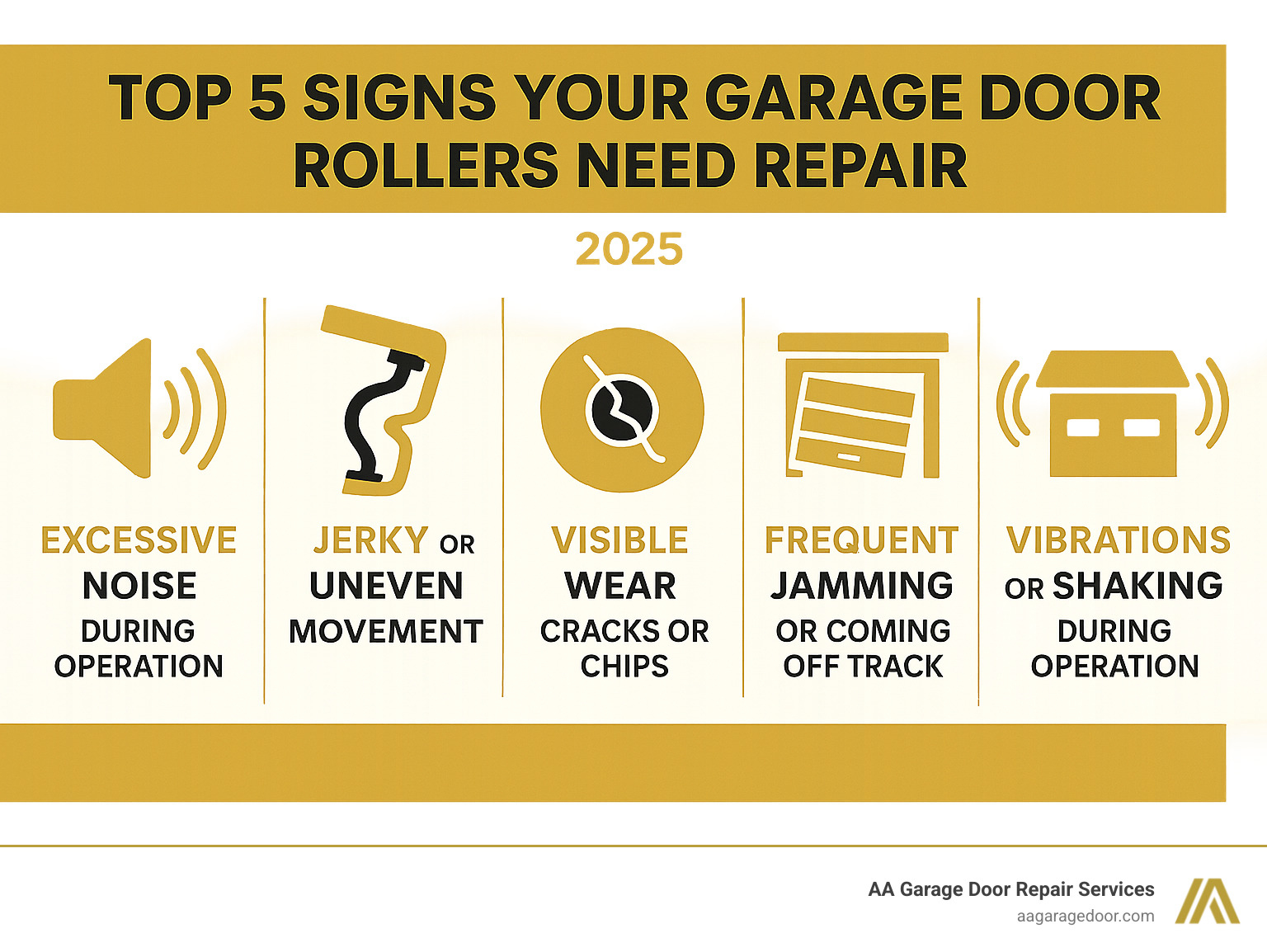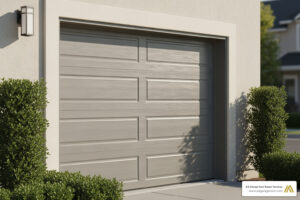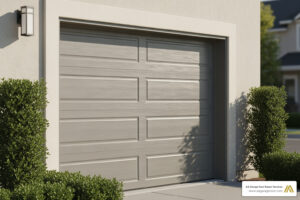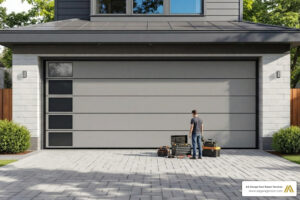Why Your Garage Door Rollers Matter
Garage door roller repair is a critical maintenance task many homeowners overlook until something goes wrong. When rollers wear out, you’ll notice squeaking, grinding, or jerky movements that strain your entire door system. The weight of your door, often over 150 pounds, rests on these small parts. When they fail, you risk damage to tracks, hinges, and your opener motor. Timely garage door repair prevents these costly system-wide failures.
Quick Signs Your Rollers Need Repair:
- Excessive noise: Squeaking, grinding, or scraping sounds.
- Jerky movement: The door stutters when opening or closing.
- Visible wear: Cracks, chips, or flat spots on the wheels.
- Jamming: The door frequently gets stuck or comes off its track.
- Vibrations: The door shakes during operation.
Roller problems are often caused by normal wear, lack of lubrication, debris in the tracks, or using the wrong roller type for your door’s weight. At AA Garage Door LLC, we’ve helped thousands of homeowners in the Twin Cities restore smooth, quiet operation to their garage doors.

When to Replace Your Rollers: Key Signs and Common Causes
Your garage door rollers work hard, guiding hundreds of pounds along metal tracks with every cycle. When they fail, the warning signs are hard to ignore, and delaying a garage door roller repair can lead to more expensive problems.
Signs Your Rollers Need Repair or Replacement
- Excessive Noise: Grinding, squeaking, or scraping sounds are the first red flag. A healthy door operates quietly.
- Visible Damage: Look for cracked, chipped, or rusted rollers. Flat spots on the wheels are also a clear sign of wear.
- Jerky Movement: If the door shakes or moves unevenly, the rollers are no longer providing smooth guidance, which strains the opener.
- Door Jamming or Off-Track: A door that frequently gets stuck or comes off its track is a serious and potentially dangerous issue. This can happen if a roller is loose in its housing.
Ignoring these problems can prevent your door from closing, compromising your home’s security. For more warning signs, see our guide on 10 Signs It’s Time to Get Your Garage Door Serviced.
Common Causes of Roller Failure
Understanding the cause helps prevent future issues. The most common culprits include:
- Lack of Lubrication: Friction from metal-on-metal contact accelerates wear. Use a silicone-based lubricant, not WD-40, which can damage bearings.
- Dirt and Debris: Grime in the tracks forces rollers to work harder and can cause them to bind.
- Misaligned Tracks: Bent or misaligned tracks create uneven pressure, causing premature wear.
- Worn-Out Bearings: After thousands of cycles (averaging 1,500 per year), the internal ball bearings can seize up.
- Incorrect Roller Type: Heavy doors require robust steel rollers, not standard nylon or plastic ones.
- Age and Environment: Time, extreme temperatures, and moisture all contribute to deterioration.
Fortunately, most of these issues are preventable with regular Garage Door Maintenance. Proactive care is the best way to ensure your door operates smoothly for years.
Choosing the Right Rollers and Gathering Your Tools
Before starting your garage door roller repair, you need to select the right replacement parts and gather the proper tools. Making the right choice here is the foundation of a successful and long-lasting repair.
Types of Garage Door Rollers: Pros, Cons, and Lifespan
The material you choose determines your door’s noise level, durability, and how soon you’ll need to do this again.
| Roller Type | Lifespan (Years) | Cost (per roller) | Noise Level | Durability | Pros | Cons |
|---|---|---|---|---|---|---|
| Plastic (Nylon without bearings) | 2-5 | $4-$10 | High | Low | Cheapest upfront cost | Very noisy, short lifespan, no bearings |
| Steel (without bearings) | 2-5 | $7-$20 | High | Medium | Stronger than plastic | Noisy, prone to rust, requires lubrication |
| Steel (with bearings) | 10-15 | $7-$20 | Medium | High | Very durable, good for heavy doors, long lifespan | Can be noisy, requires lubrication, prone to rust |
| Nylon (with bearings) | 12-20 | $10-$33 | Low | High | Quiet, smooth, durable, often sealed bearings | Higher upfront cost |
- Plastic Rollers: The cheapest, loudest, and least durable option, found on basic doors. An upgrade is highly recommended.
- Steel Rollers: Available with or without bearings. Steel rollers with at least 10 ball bearings are a durable choice for heavy doors but can be noisy and require lubrication to prevent rust.
- Nylon Rollers with Bearings: Our top recommendation for most homeowners. They are the quietest, most durable option, often lasting 12-20 years with minimal maintenance thanks to sealed bearings. The higher upfront cost is a smart investment in quiet, long-term performance.
Also, ensure the stem length of your new rollers matches the old ones for a proper fit.
Tools and Materials for the Job
Having these tools ready will make the job much smoother:
- Safety Gear: Safety glasses and work gloves are non-negotiable.
- Ladder: A sturdy step ladder for reaching the upper rollers.
- Tools: A wrench or socket set, pliers, and C-clamps to secure the door.
- Lubricant: A silicone-based spray lubricant (avoid WD-40).
- Cleaning Supplies: Rags to wipe down tracks.
- Replacement Rollers: It’s best to replace all rollers at once for even wear and balance.
For a more detailed list, check out this comprehensive tool list for garage door repairs.
The Ultimate DIY Garage Door Roller Repair Guide
While garage door roller repair can be a DIY project, it requires extreme caution. Garage doors are heavy and their springs are under dangerous tension. Always prioritize safety.
Critical Safety Precautions
- Unplug the Opener: Disconnect the automatic opener from its power source to prevent accidental activation.
- Disengage the Door: Pull the emergency release cord (red handle) to switch to manual operation.
- Secure the Door: Use C-clamps to lock the door in place. Clamp the track just above the roller you are working on to prevent movement. For bottom rollers, the door should be fully open and secured.
- Never Touch High-Tension Parts: Avoid the garage door springs (torsion or extension) and the bottom bracket cables. These are under extreme tension and can cause severe injury. If your repair involves these parts, call a professional. For more on this, visit our Garage Door Safety page.
- Wear Protective Gear: Always use safety glasses and work gloves.
Step-by-Step Garage Door Roller Repair Process
Replace one roller at a time to maintain the door’s stability.
- Secure the Door: Unplug the opener and clamp the door securely as described above.
- Remove the Old Roller: For most rollers, loosen the bolts on the hinge, pivot it away from the door, and slide the old roller out of the track. For the bottom roller, exercise extreme caution due to the attached cable. We strongly advise against DIY bottom roller replacement if you are not comfortable with cable tension. A professional can handle this safely.
- Clean and Inspect: Wipe any debris from the track section and inspect the hinge for damage. Replace it if necessary.
- Insert the New Roller: Slide the new roller wheel into the track and its stem into the hinge. Pivot the hinge back into place and tighten the bolts securely.
- Lubricate and Test: Apply a silicone-based lubricant to the new roller. Remove the clamps and manually test the door’s movement in that section.
- Repeat for All Rollers: Replace all rollers to ensure even wear and smooth, balanced operation.
- Final Test: Once all rollers are replaced, remove all clamps, reconnect the opener, and test the full open/close cycle. It should be smooth and quiet.
Fixing Bent Tracks and Proper Lubrication
- Track Alignment: Use a level to ensure tracks are perfectly vertical and parallel. Tighten any loose brackets.
- Minor Bends: Gently tap out small dents with a rubber mallet and a block of wood. For severe bends, professional replacement is the safest option.
- Proper Lubrication: Use a silicone-based lubricant on roller stems, bearings, and inside the tracks every 3-6 months. NEVER use WD-40, as it’s a degreaser that will strip away necessary lubrication and attract dirt.
DIY vs. Professional Repair: Costs and Considerations
Deciding between a DIY repair and calling a professional involves weighing cost against complexity and safety.
Average Cost of Garage Door Roller Repair
- DIY Cost: Expect to spend $25-$60 for a set of replacement rollers (standard steel or high-end nylon).
- Professional Service Cost: A full professional replacement typically ranges from $120-$250, including parts and labor. The price depends on the roller type, the complexity of the job, and your location.
While DIY is cheaper, a professional service includes expertise, specialized tools, and a warranty. For a deeper dive into costs, see our guide on Garage Door Repair Cost.
When to Call a Professional Instead of DIY
Some situations require professional help for safety and to ensure a proper fix:
- Severely Bent Tracks: Minor bends can be fixed, but twisted or severely damaged tracks need an expert.
- Damaged Cables or Springs: These components are under extreme tension and are incredibly dangerous. If you see frayed cables or a broken spring, do not attempt a DIY fix.
- You’re Uncomfortable with the Job: If you feel uneasy about the door’s weight or the safety steps, it’s always best to call a pro.
- Chronic Issues: If the door keeps jamming after a repair, a technician can diagnose the underlying problem.
- Emergencies: If your door is stuck open or off its tracks, it’s a security risk. Our team offers fast Emergency Garage Door Repair across the Twin Cities and Western WI.
Frequently Asked Questions about Garage Door Rollers
Here are answers to the most common questions we hear from homeowners in the Twin Cities area.
How often should I replace my garage door rollers?
This depends on the material and maintenance. Here’s a general guide:
- Plastic Rollers: 2-5 years.
- Steel Rollers: 5-15 years, with the longer lifespan for those with ball bearings.
- Nylon Rollers with Bearings: 12-20 years. These are the most durable.
Regular lubrication can significantly extend the life of any roller type.
Are nylon or steel rollers better for my garage door?
For most residential doors, nylon rollers with ball bearings are the superior choice. They are significantly quieter and smoother, which reduces wear on your entire system, including the opener motor. They also resist corrosion better than steel. Steel rollers are still a good option for extremely heavy or oversized commercial-style doors, but for the average home, nylon provides the best performance and longevity. For more on door materials, see our guide: Is Steel Garage Door Right for Your Family?.
Can I replace just one broken roller?
While you technically can, we strongly advise against it. Rollers wear out at a similar rate. If one has failed, the others are likely not far behind. Replacing them all at once ensures the door remains balanced, operates smoothly, and prevents you from having to do the same repair again in a few months. It’s more efficient and cost-effective in the long run to replace them as a complete set.
Keep Your Door Rolling Smoothly with Proper Care
Congratulations! You’re now equipped with the knowledge to handle garage door roller repair. Whether you choose the DIY route or call in an expert, you can make informed decisions for your home.
Regular maintenance is the best way to prevent major issues. A few minutes spent cleaning tracks and applying a silicone-based lubricant every few months can save you from the headache of a stuck garage door. Proper lubrication prevents friction, the number one enemy of rollers.
Above all, prioritize safety. If you’re ever unsure about working with the door’s weight or high-tension components like springs and cables, it’s always best to call a professional. Your safety is not worth the risk.
For homeowners throughout the Twin Cities and Western WI, AA Garage Door Services has been the trusted name in garage door repair since 2001. If squeaky, grinding rollers are driving you crazy, don’t wait. Contact us for prompt, professional service with a satisfaction guarantee. A smooth, quiet garage door is just a call or click away.









